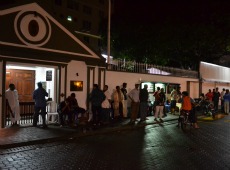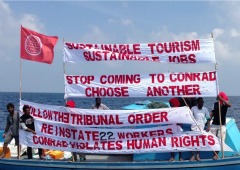The Maldives government said it has been “welcomed” back as a fully participating member in the Commonwealth Ministerial Action Group (CMAG) during the group’s 39th meeting held in London yesterday (April 26) following its suspension last year.
Minister of State for Foreign Affairs Dhunya Maumoon stated this week that the invitation for the Maldives to attend the CMAG meeting reflected the “recognition” of the work by President Dr Mohamed Waheed government’s in “strengthening democracy in the Maldives”.
The opposition Maldivian Democratic Party (MDP) meanwhile said it understood the country’s participation in CMAG was a diplomatic attempt to ensure free and “inclusive” elections went ahead in September of this year. The opposition party contended that the elections were also expected to be scrutinised by a number of international groups including the Commonwealth.
The Maldives was suspended from CMAG – the Commonwealth’s democracy and human rights arm – back in February 2012 following the controversial transfer of power that saw former President Mohamed Nasheed resigning from office after a mutiny by sections of the police and military.
By September 2012, the suspension was revoked after a Commonwealth-backed Commission of National Inquiry (CNI) concluded the previous month that the transfer of power was legitimate, that former President Nasheed was not under duress, and that there was no police mutiny.
The findings were later accepted by former President Nasheed, albeit with reservations over evidence and witness statements he claimed had not been considered in the final report.
The stance was claimed to have been taken by the former president in order to facilitate the CNI’s recommendations concerning judicial independence and a strengthening of democratic institutions.
According to the Maldives government, CMAG is charged with reviewing “serious and persistent violations of the Commonwealth’s fundamental political values”.
Return to CMAG
Taking his place at the CMAG meeting on Friday, Minister of Foreign Affairs Dr Abdul Samad Abdullah joined his counterparts from Australia, Bangladesh, Canada Jamaica, Sierra Leone, Tanzania, Trinidad and Tobago and Vanuatu to review developments in Fiji as part of the group’s formal agenda.
According to a commonwealth statement, CMAG’s latest meeting was focused predominantly on ensuring democratic developments in Fiji, including calls for constitutional reform to uphold the rule of law, while also ensuring structures were in place for hosting “credible elections” where all political parties and candidates can contest fairly.
CMAG alos used the meeting to welcome the adoption of the Charter of the Commonwealth by various heads of government, as well as other key figures in the intergovernmental organisation.
“The charter reaffirmed the Commonwealth’s commitment inter alia to democracy, human rights, the rule of law, separation of powers, freedom of expression, good governance, tolerance, respect and understanding and the role of civil society,” read an official statement. “As the custodian of the Commonwealth’s fundamental political values, [CMAG] pledged to continue to promote these commonly agreed goals.”
Political solution
Following yesterday’s meeting, MDP MP and Spokesperson Hamid Abdul Ghafoor told Minivan News that considering national democratic developments, he believed the Commonwealth continued to expect three key requirements of the Maldives ahead of elections.
Ghafoor claimed that along with conducting the CNI last year, the Commonwealth has also required free and “inclusive” elections that would allow former president Mohamed Nasheed to stand as the MDP’s candidate. He added that September’s elections were also required to be monitored by experts such as a Commonwealth team in the run up to, and during polling.
Nasheed’s participation in the elections has been in doubt over his ongoing trial for the controversial of a Criminal Court Judge while he was in power – charges that could see him unable to contest in polls this year should he be found guilty. The trial is presently suspended pending a court ruling on the legitimacy of the establishment of the court and panel of judges chosen to overhear the case.
Ghafoor claimed that the MDP, despite previous concerns about the CNI, welcomed the Commonwealth’s commitments for “inclusive” elections, especially considering findings by a number of international legal experts disputing whether Nasheed could expects a free trial as a result of alleged politicisation in the country’s courts.
However, he added that the party also hoped for a transitional administration to replace President Waheed’s government ahead of September’s voting.
“The Commonwealth’s three requirements are welcome, but we would also like to see an interim arrangement that would see this coup administration out,” he alleged. “This is something we believe that can be achieved.”
Ghafoor said that he remained unsure if the Maldives, which last September was retained on the CMAG agenda under its “Matters of Interest”, was still being monitored by the body in terms of the nation’s commitments to human rights.
Ahead of the Maldives removal from suspension of CMAG last September, former Foreign Minister and current UN Special Rapporteur to Iran, Dr Ahmed Shaheed said at the time that the country’s removal from the agenda would be “a travesty” – accusing the government of committing “reprehensible actions” following the CNI report’s release.
“Things are not going well in the Maldives – the government is intent on persecuting Nasheed and the MDP (Maldivian Democratic Party)”, he claimed at the time. “They seem hell bent on repressing the people.”
Ahead of Friday’s CMAG meeting, several NGOs complied a so-called joint human rights brief accusing the Maldivian government of failing to create conditions conducive to free and fair elections
The International Federation for Human Rights (FIDH) and the Maldivian Democracy Network (MDN) alleged there were “clear signs indicating that the coalition government in power since February 2012 has so far failed to set the conditions for free and fair elections in which ‘all parties and leaders are able freely to conduct election campaigns’.”
Meanwhile, Back in January this year, the Maldives was one of two countries to have been dropped from NGO Freedom House’s list of electoral democracies following the release of an annual survey of political rights and civil liberties.
Freedom House is an independent, non-government watchdog organisation dedicated to the expansion of freedom around the world. The NGO assesses and scores countries for political rights and civil liberties each year, and labels them ‘free’, ‘partly free’, or ‘not free’.
Contested inclusion
The Maldives government has continued to contest whether the Maldives should have ever been included on the CMAG agenda.
Minister of State for Foreign Affairs Dhunya Maumoon has previously claimed that the country’s inclusion has been a result of a “lack of understanding of the true events that transpired in the Maldives.”
“Some countries” had realised this error and accused Nasheed of influencing CMAG members, she alleged.
In April 2012, Maldives’ permanent representative to the EU Ali Hussein Didi criticised the Commonwealth’s involvement in the Maldives, telling the European Parliament that CMAG lacked a clear mandate to place the Maldives on its agenda.
Likes (0)Dislikes
(0)Dislikes (0)
(0) 
